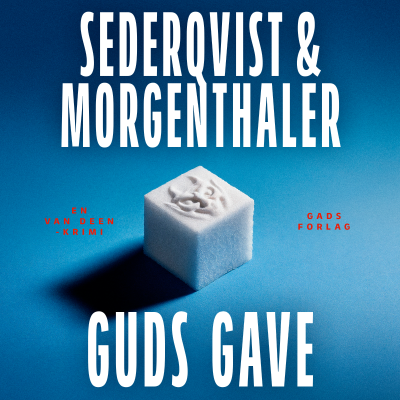
» Sermons
engelsk
Prøv gratis i 7 dage
99 kr. / måned efter prøveperioden.Opsig når som helst.
- 20 lydbogstimer pr. måned
- Podcasts kun på Podimo
- Gratis podcasts
Læs mere » Sermons
I\'m not a prophet; I\'m just named after one.
Alle episoder
5 episoderSeeing Jesus On Easter Sunday
[youtube]iI504-YxvDo[/youtube] Our opening hymn on Sunday...perhaps with a slightly different arrangement :)April 8, 2012 Easter Sunday John 20:1-18It was still dark. Mary Magdalene was on her way to the tomb to properly care for the body of Jesus her Lord. I imagine her walking briskly to the tomb in the cover of darkness, perhaps it was a cold spring morning like it has been here the last few days for us. But as she got closer, something was wrong. Something didn't look quite right. Like it may be for anyone of us when coming home late at night and something is a bit out of place. Your heart my skip a few beats, your brain tells that heart of yours that everything is probably alright, but then you realize it is not. Everything is not alright - the front door is open, and none of the lights are on. What would you think? What would you assume without seeing anything else? That you have been robbed. Mary saw that stone rolled away and assumed the worst - someone must have broken into the tomb and stole away my Lord! This is the assumption she made all from the sight of the stone rolled away. She did not look in, she only saw the stone and turned around and ran to share her fears with the other disciples.In the time it took her to run back to the disciples, tell the bad news, and for them to run back to the tomb, perhaps the sun had started to rise. But these two disciples may not have been able to see any more clearly; sweat dripping down their faces, blurring their vision. They saw the stone rolled away too, and they went a step further and into the tomb to find the funeral linens neatly folded and placed in the tomb, as if Jesus had made his bed before he left. That is certainly an oddity. What grave robber would have gone through the trouble of removing the linens, especially the trouble of neatly rolling up each piece separately. Peter saw and believed - but believed what exactly? It doesn't say that he saw and believed the good news that He is Risen! Just that he believed. Believed what? Perhaps simply that he believed Mary's report that Jesus body was gone. Yes, she was right after all, no body here - now I believe her, someone really did steal away our Lord. There is no rush back, there is no more sharing of this fearful news. Just the long journey home with what appeared to be the sad news of this empty tomb and an absent savior.Mary did not go home. She stayed behind, crying and weeping all day. She had thought that she lost her Lord forever and she was robbed of even offering him a proper burial. She finally worked up the courage to peek in and glimpse inside the tomb. Two angels! Two angels who were puzzled by the tears of Mary - why are you crying they asked. These Angels knew the truth, and yet Mary would not learn this news form them. She turned around, perhaps not even aware that she was speaking with angels right where Jesus lay.She turned around and Mary saw Jesus - but she didn't see him. She wasn't prepared to see him in her emotional state, besides she saw the dead body, and dead men don't walk. She was not prepared to see him so she mistook Jesus to be a gardener, given the context.A few years ago a world famous violinist by the name of Joshua Bell tried a social experiment. He would dress up in very modest clothes to look like a homeless man, go down to a metro stop in Washington DC and play his violin. Now, just a few days before this experiment, Joshua played for an audience where even the cheap seats were $100. He insisted on playing on his own familiar violin for this experiment, one worth $3.5 million. He played for about 45 minutes. Some of the best music ever written performed by one of the best musicians in the world, in the subway. In that time about 1,100 people walked by and heard the violinist in the background and 7 people stopped to listen for at least a minute. He received about $32 bucks in his violin case. Sometimes we might be surprised by what we don't see,
The Messiah Must Suffer the Cross
March 4, 2012 2nd Sunday in Lent Mark 8:31-38I can't seem to find the balance between good audio in the church and a good audio recording. I've had one or the other, but can't seem to get both. Any A/V geeks out there can help?What comes to your mind when you think of a savior? Superman comes to my mind. Faster than a speeding bullet, more powerful than a locomotive, and able to leap tall buildings in a single bound." It might be a last minute nail-bitter, but at the end of the day Superman always saves the damsel in distress, or the innocent children in peril. He is unstoppable, bulletproof, and he conquers the bad guys - puts them in their place. Sure there kryptonite, but that's only temporary. Superman, as a savior comes out unscathed, righteous, an example of good triumphs over evil. Is this the kind of savior we have in Jesus Christ?Jesus began to teach them… Jesus has been doing quite a bit of teaching up to this point in Mark's Gospel. We don't have the sermon on the mount in this Gospel, but there is still plenty of parables. On his travels Jesus often made it a point to enter the synagogue and teach. And there were plenty of private teaching opportunities when Jesus was alone with his disciples. He taught about the kingdom of God. But now, he began to teach them something new - that the Son of Man must suffer, be rejected, and be killed. This time there are no parables, there is no promise to keep this a secret, he spoke plainly. Our Gospel reading today is the first time that Jesus predicts his death, the first time that his disciples heard that Jesus must die, and well Peter doesn't take it too well.We read that Peter rebuked Jesus. That's simple something a disciple ought to do to the Messiah, the son of Man. We do need to give Peter some credit though; it was a rebuke out of love. He heard here for the first time that this Jesus that he loved, that he gave up a job, family, friends, safety, he gave up so much for this man he rightly believed to be The Messiah - and he just heard that his Messiah will die! It was a natural, heartfelt, loving rebuke - Say it isn't so, you don't have to die, you shouldn't die, you are the Messiah!In fact, the verses immediately before our reading, we discover Peter making the first confession that Jesus is the Messiah. Jesus asked his disciples "Who do people say I am?" And they gave various answers: Elijah, John the Baptist, a prophet. "But who do you say I am?" And Peter was the first to say "You are the Messiah." Peter was right about who Jesus was, but it would turn out, Peter was wrong about what that meant.I imagine that Peter had a superman kind of view of what the Messiah should be. The Messiah was going to come in, kick out the treacherous Roman occupiers with a heavy hand and rebuild the nation of Israel to the glory days it once knew all with power, force, and the sword if necessary This kind of savior would need power and might. That kind of savior certainly could not be killed at the hands of the people he was going to save people from! Peter expected a superman kind of savior and he got Clark Kent. He expected warrior and got victim. He expected relief and got sacrifice. Everything Peter believed about his Messiah was dashed by this new teaching of Jesus. So naturally, Peter pulls Jesus aside and double checks - I think you are mistaken about what it means to be savior Messiah can't possibly mean death, can it? Surely you don't have to die.And here is where Jesus stopped Peter short, interrupted him. Rebuked his rebuke. Peter, you couldn't be more wrong. In fact Jesus calls Peter Satan! Awfully harsh, isn't it? But when you think of it, Peter is offering a temptation to Christ. There are three times when Jesus faces significant temptation in his life - later in the garden of gethsemane when he prays that the cup of suffering can pass him by, and yet he prays for his father's will and not his will, this episode with the rebuke from Pete
“Good-News” Means Proclaiming That God Is Near
December 4, 2011 Second Sunday of Advent Mark 1:1-8 "The beginning of the good news of Jesus Christ, the Son of God.""The beginning of the good news about Jesus the Messiah." Yes, the beginning is a very good place to start, especially in Advent, and Mark just dives right in there: "The Good News about Jesus Christ, Son of God." But this isn't the familiar beginning of the story we remember is it? Where are the wise men, where are the shepherds watching over their flocks by night, the angels we have heard on high, the Star of Bethlehem, The Holy Family: Mary, Joseph, and where is baby Jesus!? Mark begins his Gospel about Jesus with writings from the Prophets Malachi and Isaiah (though Isaiah is the only one named), and of the proclamation of John the Baptist.Have you ever looked at the beginnings of the other Gospels? Each evangelist has their own way of beginning their Gospel, but there are considerable similarities too. Luke explains the purpose of his writing: Lots of people have been talking about this Jesus, and I want to tell you too. Luke begins with a birth story, John the Baptist's birth story.Matthew starts off with a genealogy of Jesus. You may know them as the "begats." Abraham begat Isaac, Isaac begat Jacob, Jacob begat Judah…and so on. You may think to yourself "O! How dreadfully boring." But there is some deep meaning when you look at it closely. Jesus being traced back to Abraham, through the royal lines of King David, each step along the begats another story; and each one pointing to the work of God even before our moment in the Bethlehem manger 2,000 years ago. And there is the Gospel of John which goes even further back, to the cosmic beginning, echoing the beginning of the book of Genesis: In *the* beginning. What does it mean to declare "The beginning of the good news of Jesus Christ." And then have a look back at the prophets?; the prophets both long ago and John who is in the midst of Christ Jesus?I believe it is an indication that God has been at work for a very long time. He has been at work in the Prophets Isaiah and Malachi, in John the Baptist, in Abraham through whom he borne his chosen people; in fact he has been at work since the very beginning of time to enact his Gospel in the world. The beginning of the good news about Jesus the Messiah. We continue to proclaim God's saving work in this day and age. What we read here is the beginning of the good news about Jesus Christ.We hear that word, Good-News or Gospel and may automatically think of the four written books Matthew, Mark, Luke, and John the Gospels we call them. We hear the word Good-News and may first think that it means story. That the Good News of Jesus Christ means the stories that tell us about the life of Jesus, particularly this time of year his birth story - manger, mary, angels, shepherd, etc. But Good News is not about the story itself, it is about the proclamation. That word for Good-News shows up in the Old Testament as well. It was often associated with the news of a military victory: Good-News, we have defeated the enemy! Or some event in the royal family like the birth of an heir: Good-News the king had a son. But it is not the news itself that is the good news, it is the proclaiming of it, the act of sharing it; good news means proclamation.God, with a word, caused all of creation to come into being, and likewise he sent prophets, and his only Son to declare his good news: "The kingdom of God is near." And the proclamation made it so, the preaching of it, the sharing of it, it is in these acts that the Good-News has it's power. It is what Jesus does - proclaim the Good-News that God has come near, that he is in our midst. The act of proclaiming it makes it so. The act of receiving that Good-News proclamation is what makes us disciples of Christ.John the Baptist is our model: Proclaiming the one who is greater than we are; pointing not to ourselves but to Jesus the Christ, the Messia
Longing for God’s Presence
Nov 27, 2011 First Sunday of Advent Isaiah 64:1-9 "That you would rend open the heavens"Welcome to Advent. It is a time for us to prepare for Christmas. Here at church we have decorated our worship space with greens, the advent wreath, and a tree. We have lit the candles and we will count the days that lead up to Christmas, that glorious night which remember that God stepped down from all heavenly glory and entered this world as a baby. For the church in the modern day, this time of year is always an observance of two Advents. One, we remember long ago, in a little town of Bethlehem; and the Second, we away with hopeful anticipation for the coming of our Lord again as promised. It is this second Advent that the readings draw our attention to today. And, at least for me - I find the second advent a bit more difficult to wait for. We have been waiting a long time, and God seems so distant at times.That is the plea of our Isaiah reading. "O that you would tear open the heavens and come down!" And the writer goes on to recount the glorious works of God throughout the ages, his righteousness, and his judgement. He puzzles over the obvious absence of God. We kept your word, but you were angry. We sinned, is that why you left? But maybe we sinned because you left?This portion of Isaiah was written after a faithful rement of Israel returned home after years in exile. They spent many years in a foreign land where other gods were worshiped, and it was difficult to maintain their Jewish identity and roots. They got through the ordeal, and folks began to come home to the holy land of milk and honey, the promised land. Only…only it was not the promised land they remembered. The city was in ruins and the temple destroyed. Yes, they were home, but it was not home. At least not as they remember it. There where familiar reminders of what home once was, but they did not serve to give comfort, but rather the pain in recognizing what was lost. Could you imagine moving away from here for 50 years, and then return to find our church on the County like in ruins?On a smaller scale, I wonder if that is similar to what it feels like when familiar Thanksgiving Dinner traditions are lost. I remember my first Thanksgiving dinner I spent away from my childhood home. I was in my early 20s, and up until that year it was just assumed that I would be home for the holidays. It was my first year in seminary, and we didn't have any money for a plane ticket home - not for both Thanksgiving and Christmas. So did not come home. A lovely couple from the church I worshiped with invited me into their home for the Thanksgiving Dinner. I very graciously accepted. It was a happy dinner, and everything was delicious; but at the same time those familiar foods and atmosphere were just similar enough, and yet just different enough to what I remember about Thanksgiving Dinner, that I became very aware that I was not at home. Where I sat, how dinner was served, how it tasted, what we discussed - all similar, but all so obvious that it was different. And all so obvious that my family was 3000 miles away, and though I sat down at a familiar Thanksgiving, I was feeling kinda alone. I wonder if that might be a bit what the Israelites felt as they returned home to a temple that they could see but could not worship in, homes they remembered yet were destroyed, a land of promise which lay in ruin.Yes, this holiday season seems to be a time of joy and sadness for many. For me, this was my first Thanksgiving, and will be my first Christmas without Granddad Coles. For many this time of year serves as a reminder of those loved ones who are no longer with us to celebrate this oh so familiar season. God may seem so absent as we await for his coming in-between two Advents.This communal cry from Isaiah seems to be an acknowledgement of something loss, and more painful than that, a recognition of the absence of God. The writer remembers those marvelous deeds whi
Christ’s Kingdom Is Where Disciples Do His Will
Nov 20, 2011 Christ the King Matthew 25:31-46 "Parable of the Sheep and Goats."Christ is King! Jesus is Lord!Today we mark the end of the liturgical year with the affirmation that Christ is King; or sometimes this Sunday is called the reign of Christ ("reign" as in the recognition that Christ is ruler over all). Since this is the end of the liturgical year, we have a Gospel parable which offers a scene of the final judgement. A scene of the end time of the end of the year. Christ upon his throne of glory. Sheep separated from goats; good from bad; righteous from unrighteous. It is how they are separated that may be surprising however. Perhaps not surprising for us the readers - of course those who fed, welcomed, and clothed Christ are the righteous ones. Those who did not were not. But both the righteous and unrighteous seemed to be surprised that they were called such.It is always a challenge preaching this concept in the United States - Christ is King. We don't have kings in America. We got our start as a country by declaring independence from a king. So there is some hesitancy to talk about kings and kingdoms, and ruling. Probably the closest thing we have to kings in American today might be bosses. Or if you are self-employed, you might think of your customers. No, they don't have absolute power like kings do. But they can tell you what to do, how to do it and when. If you don't care for those conditions you find employment elsewhere (or another customer). Some bosses can make you stay for overtime, go out of town for a trip, cut your pay, give you raises, and fire you.It's kinda like that CBS show, Undercover Boss. In it a CEO of a rather large company pretends to be a new hire and tires out some of the entry level positions within his or her own company. He gets to meet his employees and see for himself where his business (kingdom?) is running smoothly and where it is not running so smoothly. The CEO is almost always surprised at the hard work of his employees and how well they accomplish the tasks set before them (of course, sometimes they are appalled at their attitudes and actions). At the end of the show, the truly stand apart employees are called into corporate headquarters to meet who they thought was just a fellow employee only to discover that it was the CEO! They are rewarded for doing a good job, not because they were being watched by the CEO but because it was the right thing to do.I love how both the sheep and the goats are surprised in this parable. These people did not act because of a reward, or because they were being watched. They clothed the naked (or not), fed the hungry (or not), welcomed (or not), and visited (or not) because it was just part of their very nature. How very surprising indeed when Christ identifies with that naked, hungry, stranger who is in jail. Surprising.The big difference between bosses and kings though, is that you get to decide whether or not you are under the rule of a boss. If you get fed up or find a better offer you can quit and walk off the job - thus declaring that the boss is no longer yours. Generally though, it is difficult to get out of being a royal subject short of a revolution. In our parable there are folks who submit themselves to the kingdom of Christ, and there are those who don't. The difference between being in the kingdom or not is how Christ's followers serve the needy among them.We hear about the end of the world all the time. Just in my life time I can think of a handful of end of the world declarations. The Hale-bop Comet, Y2K. May 21, 2011 (later revised to Oct 21, 2011). We're still here. As Christians we do believe that Christ will come again to judge the righteous from the unrighteous and that there will be a new heaven and a new earth. But it sure does get tiring to hear all of these false prophecies. And at a point it is easy to not take the second coming seriously. This parable is an answer to those concerns. Again
Vælg dit abonnement
Premium
20 timers lydbøger
Podcasts kun på Podimo
Gratis podcasts
Opsig når som helst
Prøv gratis i 7 dage
Derefter 99 kr. / måned
Premium Plus
100 timers lydbøger
Podcasts kun på Podimo
Gratis podcasts
Opsig når som helst
Prøv gratis i 7 dage
Derefter 129 kr. / måned
Prøv gratis i 7 dage. 99 kr. / måned efter prøveperioden. Opsig når som helst.


































